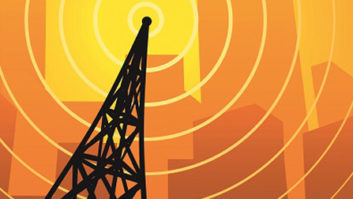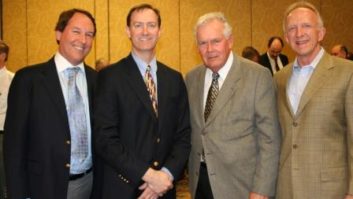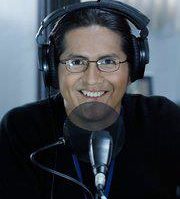The IBOC debate
Dec 1, 2003 12:00 PM
We received lots of letters relating to IBOC over the past month. Here are some of them.
The emperor has no clothes
FM IBOC (HD Radio) has been touted as the future of radio: better audio quality, no multipath, data services promising killer applications. What more could FM broadcasters ask for?
NPR compiled a CD of various music styles and voices with the original cut, an FM sample and then 96kb/s and 64kb/s codecs. The 96kb/s version is the de facto codec for FM. The 64kb/s codec is proposed for NPR’s Tomorrow Radio dual-channel service currently in development.
I received this CD and took a listen. After I picked my jaw up off the floor I started posting my observations on the Public Radio e-mail reflector (Pubtech). Radio magazine asked me to digest my comments and write them up. That’s mighty courageous of them.
Let’s start with audio quality. It’s my opinion that the current 96kb/s codec is incapable of reproducing even a simple male voice without generating objectionable artifacts. It gets worse with music. On the classical cut the strings were thin and harsh. For those of you who are broadcasting contemporary formats, the codec removes sibilance unnaturally, changes the timber of symbols and makes back up vocals strident. This is not CD-quality by a long shot. In fact, during my listening test I found that our station’s plain old analog signal sounded better than the 96kb/s codec.
My comments about these observations resulted in lots of feedback. Lets take it from the top with the comments and my reaction.
Consumers don’t care about audio quality. Really? If this is true why do the auto manufactures offer high-end sound systems as options? I don’t think GM would be offering Delco Bose and Monsoon optional sound systems if consumers weren’t buying them. If we take this argument to its logical conclusion, why would you even bother with HD Radio? If the consumer obviously doesn’t care how it sounds, the existing FM service is just fine.
HD Radio fixes multipath. We can solve 95 percent of multipath problems today with diversity FM radios. Motorola offers OEM chipsets that support this today. My 2002 Cadillac DTS with its optional Delco Bose sound system has a diversity FM radio in it and there is virtually no multipath issue.
HD Radio data service will result in �killer applications� that will revolutionize and reinvigorate data broadcasting for radio stations. We can do some of these killer applications today with RBDS, including artist and title, traffic and traffic alerts. On top of that, almost 70 percent of the cars built today have RBDS capability right now. Additionally the advanced interactive HD Radio functions will require HD Radios with built in cell phones. I can just see that coming down the pike.
Of course the real killer application that is missing is to make the HD Radios a software-defined radio that is updateable via the data stream. That would let us update the codec and radio as technology improves instead of being locked into what I consider to be a very marginal codec we have today.
So what does this all mean? Well here at KUVO we have a CPB HD Radio seed grant and we will be putting HD Radio on the air. That doesn’t mean that I like it or that it can’t be significantly better than it is now.
Mike Pappas
chief engineer
public radio station KUVO
Denver, CO
[email protected]
More on IBOC audio quality
I think the Reader Feedback comments on Quality Audio for IBOC in the November issue make some excellent points, and said what needed to be said. Having had an AM station that we spun-off primarily due to the almost total lack of decent wide-band AM radio receivers comparable to FM, I can second what was said. There is a tendency in our industry to totally embrace digital, with little or no consideration as to whether it is the best choice from a technical standpoint. Where unlimited bandwidth is available (compact disc, hard-drives, etc.), digital is the clear choice. But in dealing with limited bandwidth systems (AM and FM) every technical innovation and solution needs to be considered.
Over the years I have acquired several wide-band receivers, and can confirm that AM quality can be excellent, even on a par with FM. As a whole the broadcast industry is doing a grand job of transmitting high quality audio, considering the trashy receivers out there, which I would account for at least 99 percent the receivers. I agree that if the broadcast industry (which certainly has the resources to take on the present radio manufacturers) could begin a mass manufacturing and marketing plan of wide-band receivers, from pocket to full-size portables, clock, walkmans, boom boxes, auto and component stereo units � all with digital tuning � it could change the face of our industry. Why, I’ll bet even Wal-Mart would take on the whole line. I realize that the purpose of this project would not be so much a money-making one, but to just get decent radios in the hands of the listeners.
Raymond O. Creely
president and chief engineer
Brooks Broadcasting Corporation
Falfurrias, TX
The future of IBOC
As part of our Annual Salary Survey we asked survey respondents �Why won’t your station commence IBOC operations?� Some of the responses were posted online with the October issue. The following letter is in response to these comments.
� CS
I just read some of the comments that accompanied the Annual Salary Survey in the October issue. We are small, 250W, stand-alone AM in Ottawa, KS, and I have followed the development of IBOC closely. I think IBOC is essential to the continuation of free over-the-air broadcasting, but I think because of some of the negative reactions I have heard from the industry (like what I read from your survey) it’s doomed. One comment read that IBOC’s fate is much like that of AM stereo. To me that is a self-fulfilling prophecy. Some leadership needs to take place here.
I think the AM product has greater hurdles to clear than the FM. We are a stand-alone AM and we still play music. But if something like IBOC doesn’t come in and allow us to compete with a music format, I think it will devastate small community stations across the nation (especially AMs). One example is a station in Kansas City that moved its successful Country format from an AM frequency to an FM frequency.
Instead of complaining about how inferior it is, the industry should work to fix it if it doesn’t meet acceptable standards. Otherwise, the Internet and satellite radio will have gained a strong hold on our audiences and then in a few years we will be sitting there wondering what happened.
Brad Howard
owner/president
KOFO-AM
Ottawa, KS
Care to comment?
Tell us what’s on your mind.
Send your letters to [email protected].











